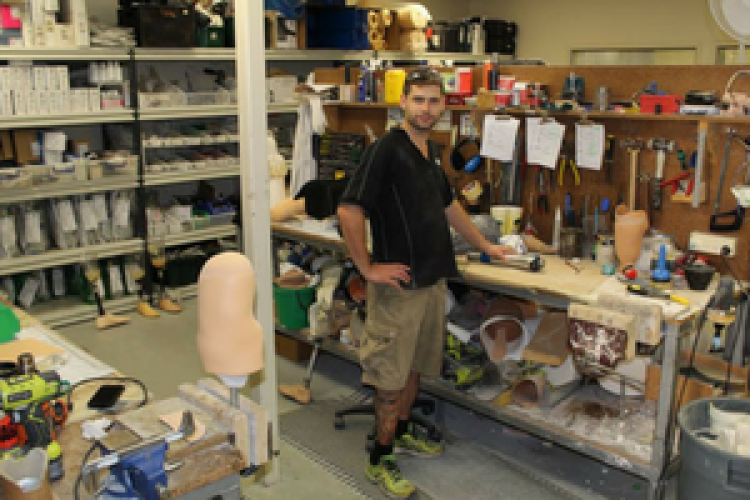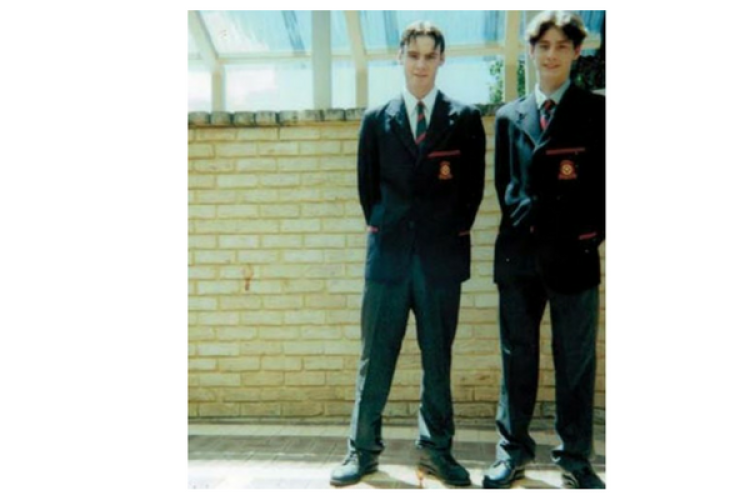- Home
- |
- About us
- |
- News and Events
- |
- Resources
- |
- Contact
- |
- Donate today
- Shop
Speaking to another amputee can make a real difference to your recovery and ease your concerns. We call this type of assistance Peer Support.
Following surgery, you will need time to recover. It is also a time to set goals about your journey ahead. Here, we help to guide you through the process to navigate your pathways forward.
Effectively managing your short and long term health will lead to better outcomes and prevent future problems.
Getting the right kind of prosthesis to suit your lifestyle needs and daily level of activity is important.
People are often concerned about the costs involved in getting a prosthesis. In Australia, there are a number of different funding schemes and it can be easy to get confused and to know what you are eligible for.
Home / Peer Support / Personal Stories / Profiles / Jason Honeychurch

Jason Honeychurch’s life can be broken into three distinct periods. Life before his traumatic accident at 9 years of age, the life he lived until he was 15, and the life he has lived since he was 15. Jason is 31 years old, lives in Adelaide (South Australia) and has lived his life as a right above-knee amputee since he was 15 years of age. Jason also works in the prosthetics industry, as a Prosthetic Technician, and will commence a Masters in Prosthetics and Orthotics in 2017.
Jason grew up Leonora which he describes as a town that is “an isolated one in the middle of Western Australia where Kalgoorlie, despite being 300 kilometres away, is the nearest big town”. It was in Leonora where Jason had a traumatic accident that would change his life forever. Being an industrial mining town Leonora’s “main drag” had huge trucks and cranes driving through each day.
“I had an accident in 1994 when a big industrial mobile crane came onto the foot path as I was riding my push bike.
The red mobile crane flashed before my eyes and in that moment I landed under the wheels of the crane, resulting in my legs being crushed,” explained Jason.
Jason was rushed to the small local hospital and, because of the extent of his injuries, then airlifted to Perth by the Royal Flying Doctors Service.
“The doctors managed to save both of my legs, but my right leg was crushed beyond repair. I then spent the next six years in and out of Princess Margaret Hospital in Perth and had over 250 operations while doctors tried to save my right leg,” recounted Jason.
While Jason’s left leg was functional, unfortunately his right leg was not. As a result of the accident, his right leg had lost a lot of skin, muscle and bone and his right knee was permanently fused. This meant that Jason couldn’t bend his leg and that it no longer grew.
By the time Jason was 15 his right leg was 10 centimetres shorter than the left one, and he had to wear a 10 centimetre Ankle-Foot Orthosis (AFO) to balance his right and left leg so he could use crutches. “Because my right leg wouldn’t bend I couldn’t walk or sit easily, let alone run or ride a bike,” described Jason.
“I was offered a ‘leg-lengthening procedure’ which, in my case, meant many pins stuck through skin and into my bone. I was also told that it would be an extremely painful procedure whereby the doctors purposefully break your leg with each turn of the pins until you stop growing,” expounded Jason.
As the doctors anticipated that Jason would probably stop growing at 18, if he selected this procedure he faced another three years of painful hospitalisation.
Prior to undergoing his amputation, and to ensure that Jason understood his decision, the hospital arranged for psychiatric assessments, discussions with physiotherapists and meetings with a few amputees. Jason met with three adult amputees prior to his surgery, an experience that made all the difference in his decision making. One particular amputee had a huge impact on Jason; a man who was an above-knee amputee, in his 30s, played sport, worked full-time and was in a relationship.
“I was 15 and the one main worry that played on my mind was whether or not a girlfriend would ever want to go out with me if I had a missing leg. Well, that was all clarified when I met another above knee amputee who, after we had met, introduced me to his beautiful long-term girlfriend who not only kissed him but touched him on his prosthesis,” explained Jason. “It was at that point I knew that becoming an amputee would not only benefit me physically but that it wouldn’t stop me from having a girlfriend, something very important to an impressionable male teenager,” laughed Jason.
So at the age of 15, and with the full support of his parents and family, Jason underwent an above knee amputation. “The first thing I remember saying to my Mum after my surgery was “Is my leg gone?” and after Mum said “Yes” apparently I went back to sleep with a smile on my face,” said Jason. Much changed within the six weeks after Jason’s amputation. “I was fitted with my first prosthesis and started in Year 10 at Aquinas College, a boarding school in Perth that my older brother already attended,” stated Jason. Aquinas College is an all-male school with over 1,000 students and a long history steeped in both academic and sporting achievement. “Attending Aquinas College really helped me to quickly adapt. Suddenly I had to walk up and down, I had to go up four flights of stairs just to get to my math class, I began playing sport for the first time since I was nine and I had an older brother with me who wouldn’t let me lag behind him. I had to adjust and stand up for myself very quickly and, while I hated it at times, I now realise it helped me to become the resilient person that I am today,” explained Jason.
Three particular events occurred whilst Jason was at his boarding school – work experience, discovering a passion for rowing and falling in love with his first girlfriend. After his amputation Jason began seeing Andrew Vearing, his first prosthetist. Andrew not only madehis first prosthesis but was a trusted professional who made Jason “feel special, full of potential and could see a budding young interest in prosthetics”. Andrew provided Jason with work experience opportunities in Years 10, 11 and 12; experiences that allowed Jason to see first-hand the “amazing impact that Andrew had on patients, and just how much respect he was held in the eyes of colleagues and patients alike”.
After the work experience opportunities with Andrew Vearing, Jason then knew he also wanted to work in the prosthetics field and upon finishing school Andrew employed Jason as a Prosthetic Technician. The second significant event that took place whilst still at school was that Jason discovered a passion and skill for rowing. “At Aquinas College all students, including me, were expected to take part in sports. I chose rowing and learned that I not only enjoyed it but that I was good at it,” revealed Jason. In Year 12, Aquinas College took part in the prestigious ‘Head of the River’ school rowing competition with Jason one of the four oarsmen selected to represent the school.
I couldn’t believe it, it was like I was a celebrity,” revealed Jason. Indeed Jason was also thrilled to be awarded with the ‘Best Oarsman Award’ after the race, a recognition that “completely floored” him. The third event experienced during Jason’s secondary schooling years was meeting his very first girlfriend. “I used to love dancing and I always thought I would meet my first girlfriend on the dancefloor and, in fact, that’s what happened,” said Jason.
At a school formal Jason met the young woman who would be his girlfriend for a couple of years. “I was overcome by my girlfriend’s positive reaction to my limb loss, and I could then focus on the other normal things that worry teenagers when starting relationships,” disclosed Jason. After leaving school Jason was privileged to be mentored and supported by Andrew Vearing in his first role as a Prosthetic Technician. Jason was also supported by Andrew to “pick up stumps” and move to Adelaide to continue working as a Prosthetic Technician. Initially, Jason worked at Northern Prosthetics which was followed by a move to Prostek, where he has now worked for ten years. It was also during this time that Jason completed a Bachelor of Health Sciences at Flinders University.
“When I turned 24 I decided that I wanted a tertiary education in the health sciences area. With the support of Prostek’s owner, Wayne Bowker, I was able to attend Flinders University part-time and also continue working part-time at Prostek. It was an extremely gruelling few years, but without the support of Prostek I wouldn’t have gotten through it and I can’t thank Wayne enough for that opportunity,” extolled Jason. As a Prosthetic Technician, Jason feels “privileged” to work alongside talented colleagues and support prosthetic-using amputees to achieve their goals. Jason thoroughly enjoys assisting children and adults to receive the prosthesis designed by their Prosthetist, and is particularly thrilled when he is able to work alongside patients to create colourful prostheses that reflect the individual’s personality.

“Working with kids is great because their imagination really does go wild, and I love being able to help them incorporate fabrics of their favourite superhero or cartoon character into their socket design,” enthused Jason. To protect his own prosthesis at work Jason wears a fabric tattoo armsleeve over the top, as this acts as a protective barrier against all the dust in the workroom.
Jason has seen significant advances in prosthetics since his amputation in 2000. Initially Jason was issued with a safety knee which was very basic, and heavy. He would have to put weight onto the safety knee for it to lock. This leg didn’t have a gel-liner with a pin-lock which meant Jason had to wear thick woollen socks with leather straps that went around his waist and over his shoulder to secure the leg, something that “was very painful, heavy to wear, hot and didn’t allow for comfortable walking”. In the years after his amputation gel and silicon liners were introduced, and it was only a few years after his amputation that Jason was able to move to wearing a more advanced legs with a computerised knee unit that allows him even more mobility and abilities.
Since first meeting Andrew Vearing, Jason always thought his eventual career would be as a qualified Australian Prosthetist. Jason was recently accepted into the Masters of Prosthetics and Orthotics program at La Trobe University (Melbourne) and commenced his studies in 2017.
“I am thrilled that I will be able to achieve my ultimate career goal and be able to work as a clinician supporting child and adult amputees.
Jason admits to feeling a little isolated when he was a teenager, but now realises that some of his school peers were nervous talking about his amputation because they were worried they would upset him. “It was only later that I discovered that it was my responsibility to take the initiative to approach others and make them feel comfortable with the fact that I had a limb difference because, after that, then the barrier was down for all of us,” explained Jason.
“Follow your dreams and believe in your vision, believe in you and seek support, support people around you, never give up, and use your limb difference as a strength, not a weakness”.
Keep up to date with our latest news, events and information
